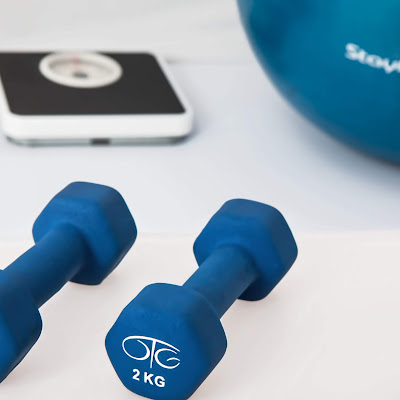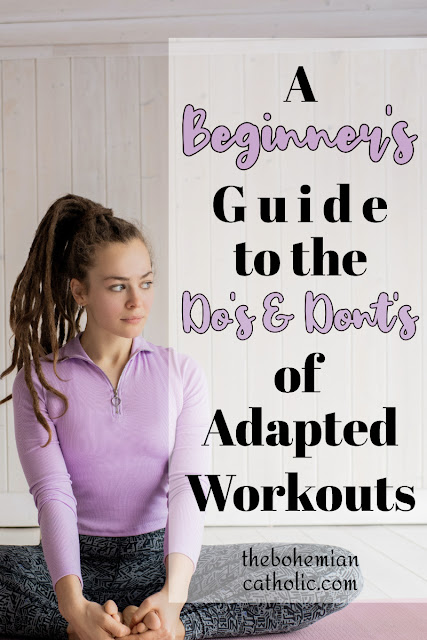Dear Reader,
I don’t know what your circumstances are, but as someone who deals with chronic health issues learning about adapted workouts was a game changer for me! Instead of looking up a workout, being intimidated, and declaring in frustration, "I don’t think I can do that", I can now say with confidence, "Well, let’s see how we can adapt that." And really adapted workouts aren’t just for people with illness or disabilities, but also great for people who are dealing with a short term injury, or who are temporarily stuck indoors (ahem, global pandemic anyone?).
I don’t know what your circumstances are, but as someone who deals with chronic health issues learning about adapted workouts was a game changer for me! Instead of looking up a workout, being intimidated, and declaring in frustration, "I don’t think I can do that", I can now say with confidence, "Well, let’s see how we can adapt that." And really adapted workouts aren’t just for people with illness or disabilities, but also great for people who are dealing with a short term injury, or who are temporarily stuck indoors (ahem, global pandemic anyone?).
Adapted workouts are going to empower you, keep you fit, and the best part - are easy to find once you know what to look for! But don’t worry, I got plenty of references and links at the bottom so you don’t have to worry about spending a few hours with a search engine :)
I was born with a genetic condition called A1AT, which causes lung damage over time. I now also have moderate asthma, and mild COPD. On good breathing days (which luckily are most days), I can do most exercises with decent mobility. On other days, not so much. Because I can’t be consistent, I would get easily frustrated with a paid program, gym membership, or app incentives (click here to read my post about which FREE fitness community does work for me, and has for the last three years!).
Someone suggested typing in "Adapted" in front of the exercise name, and holy buckets! I was floored when I realized that almost ANY exercise could be customized, and likely has a picture and video already accompanied by professionals, which took out all the guess work on my end!
I can now do adapted burpees, and mountain climbers (the real things would have had me crashing to the floor), and just about any other exercise. And hey, who doesn’t love gym equipment? But I live in an 800sq feet apartment, on one income - so that’s not really an option for me. And yet, my exercise ball, rubber bands, kettleball, hand weights, and a chair (and a wall) are all I need! Really to start with, I’d argue a chair, and a wall would do just fine as well!
But before we dive in, be sure to pin this image for future reference:
So here are the Do’s and Don’ts
DO take an honest look at your capabilities
Okay, this one is HARD because who wants to acknowledge they can't do something? Or maybe it's the opposite, maybe you've felt like you can't do anything right, and need some support. So let me be clear, there's a difference between informed realizations, and expectations. Informed realizations means you take a look at all the facts: looking inward, doing mental body scans, discussing an exercise program with a medical professional (but more on that later). You'll be surprised to realize that there is far more you are capable of that you've probably been given yourself credit for! But you do need to reevaluate your expectations (though again, that's probably not a bad thing!)
DON’T dive in, assuming you’re unstoppable
Going with the previous point . . . don't get so excited, you're like, "YES I can do a headstand now!", if you've never done one before. Know yourself, talk with a doctor, or a PT/OT therapist, evaluate yourself and remember - if you can't do burpees, OH WELL, especially if you can do 100 mountain climbers instead ;)
DO ask your doctor if there is anything you should avoid
You know that general warning of "don't begin this exercise program till you discussed it with a doctor"? Yeah, here comes the disclaimer to this whole post: I am not a medical professional, and I do not know what you are, or aren't, capable of. You should be cleared by a medical professional first. And on the top of the list of questions to ask is, "Is there anything I should avoid?"
DON’T avoid health care professionals (including PT/OT) who might have great suggestions for equipment
Look I get it, it sucks to be vulnerable and have these medical appointments and feel like the only thing you're discussing is all the things you CAN'T do. But try to stay focused on what's left - on all the things you can do. And don't be afraid to ask if there are adaptions/equipment you can use that can help, that's what they are there for! I personally find that a chair, and a wall, work really well for me - but again, everybody's needs are different.
DO watch the suggested videos instead of winging it based on the description
You're going to look up these search results and be ready to dive in because you're excited to find a tailored program that works for you. But really try to make sure to watch a video so you don't miss an important step. Any workout can be dangerous if not done properly, irregardless of physical strength.
DON’T expect results in one workout
This seems like an obvious one, but I'll mention it anyway, because who doesn't wish they could do one workout session and see those pounds melt away and those muscles strengthened? I hear you, but we got to keep it realistic. It takes consistency, and time.
DO listen to your body
Sounds like a trick question doesn't it? For those with chronic illness, we sometimes feel like we are separate entities from our bodies. That our bodies are our enemies for not listening to what we are telling it: "be well". You might even have to do some meditative work before you engage in a workout regime [ here's a link to 8 Christian meditations techniques if you are not comfortable with yoga ]. But there's a difference between some soreness as your muscles are strengthened, and a genuine injury. If you are unsure if you can tell the difference - STOP - and discuss your symptoms with a healthcare professional first.
And please know that it happens to the best of us. I personally really struggled with gym class after my diagnosis with asthma - and I do have to be careful with cardio, but I can strength condition really well! Well I basically needed my trained, educated, P.E. teacher to assure me what parts sounded like my lungs needed a break, and what was just dehydration, and muscles getting used to the routine. A trainer might be a great idea for a few sessions, while you learn to listen to your body!
DON’T avoid the stretches just because you did "light" work
Alright, most of us are doing adapted workouts, because we got some physical limitations going on. Which means we need to be extra careful with the body we are working with. As "dumb" as it might seem to do stretches for something as "light" as bed yoga . . . do it anyway. Before and after!
DO look at the whole package
What I mean by this, is don't rely just on a scale. Yes, BMI is a good tracker for some body types, but just as important is looking at waist to hip ratio as well as genetics, medications, diet, etc. One of the BEST things I ever did, was three years ago, I measured my entire body with dollar store fabric tape. I would measure every month, irregardless of what the scale said. And I'm glad I did! I "only" lost 20lbs, but then gained 13lbs of muscle. How do I know it wasn't fat? Because even though the scale went up, my measurements went down! But had I just listened to the scale, I would have been totally discouraged ~
So if that scale isn't moving, look at "non scale victories" (often written as #nsv on social media). Some other examples are: jeans that didn't fit earlier in the year but do now, or a "face to face Friday" post where you compare a year difference. You might not feel like there's been a change, and the scale might not say so either, but then you look at those before/afters and you're like, "Hey now - wow!"
DON’T assume you can avoid other areas of your life, and a 30 minute workout will take care of everything
This is pretty self explanatory, but I want to be honest - the following situation can happen to anyone: you finally figure out a workout routine you CAN do with your body . . . and you get that gym boost, and then you still get discouraged because it still didn't do anything. And there can be MANY reasons for this (again, talk to your healthcare professional). You could be on medications that are interfering with things, you could be eating more than you think you are, or you think you burned more calories than you did. As hard as it is, be patient and realize it's a lifetstyle change, not a 30 minute makeover.
Whew, there you go! That's it, and you made it!! I know I threw a lot at you, but I wanted it to be a well rounded guide, and help you take a deeper look inside yourself AND encourage you that almost anyone can find a routine that works for them with a little effort.
If you're feeling a little overwhelmed searching for yourself though, here's a few links that might be a good start:
Full Body Routine via Special Strong [ LINK ]
11 Quick Chair Exercises via Working Mother [ LINK ]
An overview of exercises for asthmatics (with great suggestions!) [ LINK ]
Much love,
Stock photo: Alexy Almond via pexels.com





Post a Comment